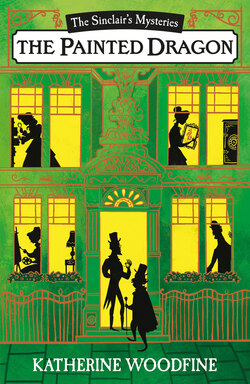Читать книгу The Painted Dragon - Katherine Woodfine - Страница 9
ОглавлениеCHAPTER ONE
October 1909
She wasn’t sure exactly when she realised that someone was following her. The interview with Detective Worth had taken longer than she had expected, and when she stepped out on to the street, it was already dark. The daytime crowds had vanished and Piccadilly seemed unnaturally quiet, with only a few figures hurrying by in the rain, their faces hidden beneath their umbrellas.
In a different mood, she might have thought that the way the yellow light from the street lamps shimmered on the wet road was beautiful. She might have wondered about how she could paint the hazy reflections in the shop windows, or the headlamps glowing in the dark. But for once, she was not thinking about painting. She was too distracted by her conversation with Detective Worth to pay attention to anything around her.
The evening air was cold and dank: she found herself shivering in spite of her good coat. She thought longingly of tea and a warm fire, but she dared not hurry home too quickly – the pavement was slick with water, and slippery with damp leaves. Instead, she slowly picked her way towards the underground railway station.
When she became aware of the man walking behind her, she had the feeling that he must have been there for some time. Lost in her thoughts, sounds muffled by the rain, she had not noticed his presence. Now, she glanced up into a darkened shop window and saw his reflection for a split second: a shadowy shape with square shoulders and the outline of a bowler hat. He was a few yards behind, keeping pace with her – she could hear the regular rhythm of his footsteps. All at once, she felt the creeping sensation that there were eyes fixed upon her back.
She shook herself. She was being stupid, she squashed down the impulse to turn around and look. He was probably just some ordinary man leaving his office late after a long day. To prove it to herself, she made up her mind to cross the road, feeling sure that he would not follow. There, she told herself triumphantly, as she made her way across the street, and on to the opposite pavement. She knew she had been imagining things. The interview with Detective Worth had rattled her, that was all.
For a few yards, she walked more easily. But a moment or two later, she heard it behind her again: the steady beat of footsteps. A chill swept over her. The man was still there.
She couldn’t help glancing over her shoulder now, but in the darkness all she could see was the silhouette of the bowler hat moving towards her. Alarmed, she turned and crossed the street again: a minute later, the man followed. Her heart had begun to thump painfully in her chest, and her breaths were quick and sharp. She hurried on, as quickly as she dared, but the footsteps just seemed to grow louder. She went faster, panic rising, sure of nothing except that she must get away.
As she drew closer to the station, the street became busier, and she saw to her relief that a little crowd of people had gathered outside a brightly lit concert hall. The evening performance was about to start: there were motor cars and hansom cabs outside, and the sound of voices and music. She made her way into the crowd, weaving her way through the mass of people, and then out again, on to the street beyond, red-cheeked and panting – but alone.
Just around the corner was the entrance to the underground station. She hurried thankfully down the steps and out of the rain, her heart still bumping, fumbling for her ticket with shaking fingers. She made her way along the empty tiled passageway, moving more slowly now. The sudden quiet was a relief.
There was no one to be seen on the station platform – not even a guard on duty. She stood alone at the edge of the platform, staring up at the big clock, watching the second hand flick forwards. Here, everything seemed ordinary again. The ticking of the clock, the tattered advertisements for Bird’s Custard and Fry’s Milk Chocolate, the colourful poster instructing her to ‘Take the Two-Penny Tube and Avoid All Anxiety!’ were soothing. Her breathing began to slow. She almost began to wonder if she had imagined the man in the bowler hat was following her, after all.
She felt more tired than ever now, and she stared down the tunnel into the darkness beyond, willing a train to appear. But even as she did so, she heard it again: the heavy, hollow thud of footsteps approaching along the empty platform.
There was no time to turn around; no time to think; no time even to scream. The man was behind her; she felt the scratch of his rough coat sleeve, the cold leather of his gloved hand, pressed hard and shiny across her mouth, silencing her before she could make a sound.
Even as she tried to twist away, she knew it was hopeless. The leather glove covering her mouth was scarlet: the bold cadmium red of her paintbox. It was the last thing she saw clearly before he pushed her. There was a clatter and a gasp, and she was falling through the air for a moment, landing on the train tracks with a sickening thump – then everything was still.
She groaned. Her eyelids fluttered. She was sprawled painfully across the tracks: she could feel the hard metal rail pressed against her side. Before her, the dark mouth of the railway tunnel yawned open, vast and pitch black. Then came a flicker of light ahead – and the scream of a train, rushing out of the tunnel towards her.
